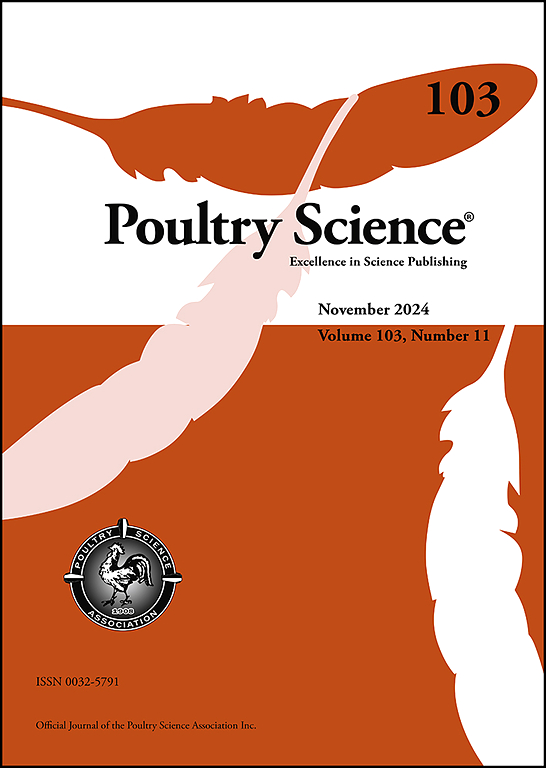饲粮添加l -亮氨酸对蛋鸡生产性能、蛋品质、血清生化指标、抗体效价和蛋胆固醇含量的影响
IF 3.8
1区 农林科学
Q1 AGRICULTURE, DAIRY & ANIMAL SCIENCE
引用次数: 0
摘要
本试验旨在研究添加亮氨酸(leucine, Leu)对蛋鸡生产性能、蛋品质、蛋胆固醇含量、抗体效价和血清生化的影响。试验选用LSL品系33 ~ 41周龄商品蛋鸡300只,采用完全随机设计,6个处理,5个重复,每个重复10只鸡。6种饲粮处理分别在含有1.08%可消化亮氨酸的基础饲粮中添加0、0.1、0.2、0.3、0.4和0.5%的l -亮氨酸。饲粮添加l -亮氨酸对蛋鸡生产性能(产蛋量、蛋重、蛋质量、采食量和饲料系数)无显著影响。蛋品质的性状(形状指数、壳、蛋白、蛋黄相对质量和壳厚度)显著(P <;0.05),以添加0.1% l -亮氨酸时质量最高。鸡蛋胆固醇含量显著(P <;l -亮氨酸添加组与对照组相比显著降低(0.05)。血清抗新城疫(ND)和禽流感(AI)病毒抗体滴度显著升高(P <;0.05)。l -亮氨酸添加水平较高(0.3 ~ 0.5%)时,血清白蛋白、钙和总蛋白降低(P <;0.05),尿酸和甘油三酯浓度升高(P <;0.05)。综上所述,饲粮中添加0.1%的l -亮氨酸在不影响蛋鸡生产性能的前提下,提高了蛋鸡的蛋品质和免疫力。本文章由计算机程序翻译,如有差异,请以英文原文为准。
Effects of dietary L-leucine supplementation on performance, egg quality, serum biochemical parameters, antibody titer, and egg cholesterol content of laying hens
This experiment was performed to investigate the effects of leucine (Leu) supplementation on performance, egg quality, egg cholesterol content, antibody titer, and serum biochemistry in laying hens. A total of three hundred commercial laying hens (33 to 41 wk, LSL strain) were used in a completely randomized design with six treatments and five replicates of 10 birds each. The six dietary treatments consisted of graded levels of L-Leu supplementation (0, 0.1, 0.2, 0.3, 0.4, and 0.5 %) added to a basal diet containing 1.08% digestible leucine. The performance of laying hens (egg production, egg weight, egg mass, feed intake, and feed conversion ratio) was not significantly affected by dietary L-Leu supplementation. Egg quality traits (shape index, relative weights of shell, albumen, yolk, and shell thickness) were significantly (P < 0.05) affected by the Leu levels, with the highest quality observed at 0.1% L-Leu supplementation. Egg cholesterol content was significantly (P < 0.05) lower in the L-Leu supplemented groups compared to the control group. Serum antibody titers against Newcastle disease (ND) and avian influenza (AI) viruses were significantly increased (P < 0.05) by dietary L-Leu supplementation. At higher levels of L-Leu supplementation (0.3 to 0.5%), serum albumin, calcium, and total protein decreased (P < 0.05), while uric acid and triglyceride concentrations increased (P < 0.05). In conclusion, dietary supplementation of L-Leu at the level of 0.1% improves egg quality traits and immunity in laying hens without compromising their performance.
求助全文
通过发布文献求助,成功后即可免费获取论文全文。
去求助
来源期刊

Poultry Science
农林科学-奶制品与动物科学
CiteScore
7.60
自引率
15.90%
发文量
0
审稿时长
94 days
期刊介绍:
First self-published in 1921, Poultry Science is an internationally renowned monthly journal, known as the authoritative source for a broad range of poultry information and high-caliber research. The journal plays a pivotal role in the dissemination of preeminent poultry-related knowledge across all disciplines. As of January 2020, Poultry Science will become an Open Access journal with no subscription charges, meaning authors who publish here can make their research immediately, permanently, and freely accessible worldwide while retaining copyright to their work. Papers submitted for publication after October 1, 2019 will be published as Open Access papers.
An international journal, Poultry Science publishes original papers, research notes, symposium papers, and reviews of basic science as applied to poultry. This authoritative source of poultry information is consistently ranked by ISI Impact Factor as one of the top 10 agriculture, dairy and animal science journals to deliver high-caliber research. Currently it is the highest-ranked (by Impact Factor and Eigenfactor) journal dedicated to publishing poultry research. Subject areas include breeding, genetics, education, production, management, environment, health, behavior, welfare, immunology, molecular biology, metabolism, nutrition, physiology, reproduction, processing, and products.
 求助内容:
求助内容: 应助结果提醒方式:
应助结果提醒方式:


